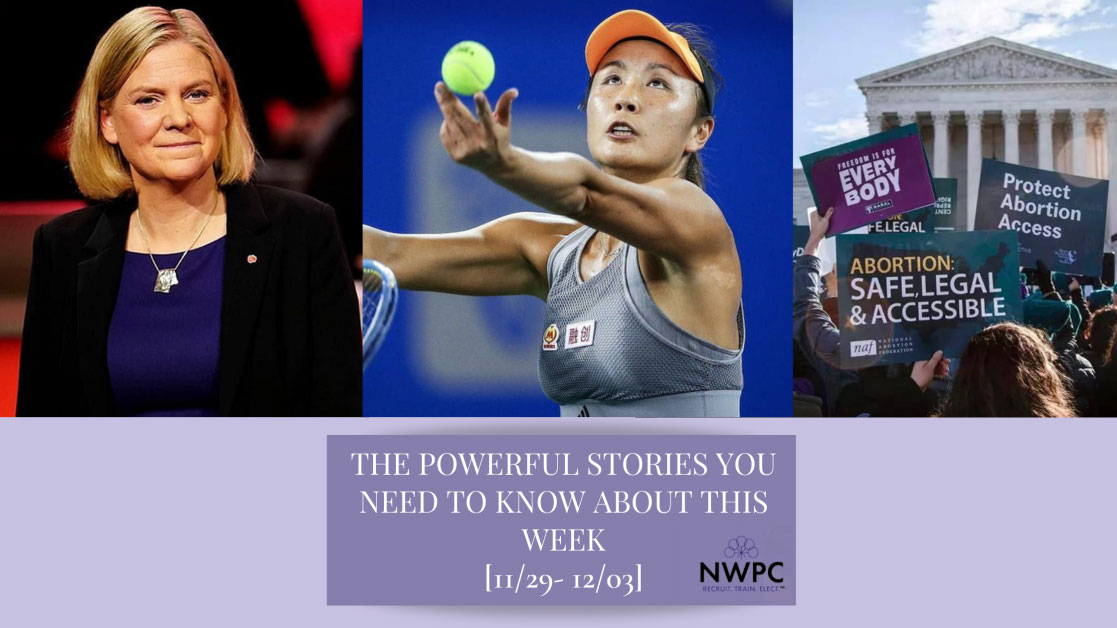 By Olivia Rynberg-Going, NWPC Political Planning and Action Intern
By Olivia Rynberg-Going, NWPC Political Planning and Action Intern
Magdalena Andersson, the newest Prime Minister of Sweden
Magdalena Andersson is the first female Prime Minister of Sweden. Andersson previously served as Sweden’s Minister For Finance from 2014 to November 2021. In the past week, Andersson was elected to, resigned from, re-elected to, and finally re-assumed her position as Prime Minister of Sweden. (Phew! It’s been a long week!)
Andersson is part of the Social Democratic Party of Sweden, which holds 100/349 seats in Swedish Parliament. Last week, a mere 7 hours after assuming the position of prime minister, her party’s budget proposal was rejected in favor of a proposal by the Swedish Democrats – the right-wing populist political party in direct opposition of Andersson’s party.
The Social Democratic Party of Sweden and the Green Party of Sweden, when working together, hold a tenuous two-party minority. After Andersson’s budget proposal was rejected, The Green Party left the Swedish government. Andersson subsequently resigned, to avoid leading “a government where there may be grounds to question its legitimacy.”
After her resignation, news sources and online critics were quick to hail her as the 7-hour prime minister. However, Andersson has returned to her new role, having won two elections in less than a week. Andersson will now govern Sweden under the opposition-drafted budget, but Andersson remains undeterred.
Sweden reported the highest percentage of female parliamentarians of any country in the European Union in 2020 – approximately 50%. U.S. News & World Report ranks Sweden the #1 country for women (the U.S. is ranked 18th), and the Global Gender Gap Report ranks Sweden 5th on a list of “gender-equal countries” (the U.S. is ranked 30th).
Former Swedish Foreign Minister, Margot Wallstrom, said Andersson’s (double) election will help young women realize “it is possible also to reach the highest political post” and “more women means more peace.”
Where is Peng Shuai? (pronounced: pung + sh-why)
Peng Shuai is a Chinese professional Tennis player who has won two Grand Slam doubles championships, and is a three-time Olympian. In 2014, Peng was ranked the number one doubles player by the Women’s Tennis Association. The WTA ranking system has existed since 1975, and Peng is the first Chinese player to earn the top spot. Recently, Peng Shuai has become the public face of China’s MeToo Movement, at the same time, Peng Shuai has disappeared.
On November 2, 2021, Peng posted a long note on Weibo – a Chinese social media site similar to Twitter – in which she accused Zhang Gaoli, of sexual assault. Zhang Gaoli, 75, is a former Vice Premier of the People’s Republic of China, which is one of the highest and most powerful political positions in China. Peng Shuai, 35, alleges that three years ago Mr. Zhang invited her to his home and “forced [her] to have relations.” From her account, it is clear that Mr. Zhang knew that their encounter wasn’t consensual. Sources report that their subsequent three-year relationship was consensual – a factor that is neither mitigating nor verifiable.
Peng’s Weibo post was taken down within minutes, and her entire account – with more than half a million followers – has been deleted. On Wednesday November 17, 2021, a Chinese broadcaster heavily affiliated with the Chinese government, released an email supposedly from Peng Shuai. The email retracts her sexual assault allegations, claiming that her Weibo post was released without her knowledge. The email also says, “I’m not missing nor am I unsafe. I’ve just been resting at home and everything is fine”, which is ominous, considering nobody outside of the Chinese government can account for her since her last Weibo post was from weeks ago. While meant to be reassuring, the email has had the opposite effect.
Steve Simon, Chairman and CEO of the WTA, received the email that is supposedly from Peng, and has begun voicing his concern to American social media and news outlets. The WTA joins fans worldwide demanding proof that Peng is alive and well.The Women’s Tennis Association is prepared to pull out of future deals with China, including a 10-year contract worth hundreds of millions of dollars, if Peng is not fully accounted for, and her accusations remain uninvestigated.
Peng Shaui’s possible disappearance has rippled across the world with little chance of stopping, and The Beijing Winter Olympics will start on February 4, 2022. President Biden has received bipartisan support for a diplomatic boycott of the winter games – meaning that American athletes may compete in Beijing if they wish to, but government officials wouldn’t be in attendance. White House statements clarify that multiple human rights abuses, including Uighur concentration camps, and censorship in Hong Kong, have led to the president’s consideration of the boycott. The UN is calling for proof of Peng’s whereabouts.
When foreign media mentions Peng Shaui, Chinese viewers’ screens go black. Weibo posts about Peng’s disappearance are systematically deleted, which has led to the hashtag “Where is **” – asterisks used in place of her name to avoid further censorship.
On November 18, 2021, Serena Williams tweeted: “I am devastated and shocked to hear about the news of my peer, Peng Shuai. I hope she is safe and found as soon as possible. This must be investigated and we must not stay silent. Sending love to her and her family during this incredibly difficult time. #whereispengshuai”
On November 30, 2021, the Women’s Tennis Association announced the immediate suspension of all WTA tournaments in China including Hong Kong.
Videos and pictures of Peng Shuai alive and well have circulated the internet for weeks. These images, often posted by Chinese government affiliates, aren’t verified as occurring after Peng’s Weibo post. In the eyes of many, Peng Shaui is still missing.
Supreme Court: Dobbs v. Jackson Women’s Health Organization
On Wednesday, December 1, 2021, the Supreme Court of the United States heard oral arguments in the case of Dobbs v. Jackson Women’s Health Organization. This is the most consequential reproductive rights case the US Supreme Court has heard in decades, and will shape the rights of American citizens for generations to come. In 1973, the Supreme Court recognized the right to an abortion in their landmark case: Roe v. Wade. This right has been infringed upon in Mississippi, which led to it’s debate before the Court on Wednesday, the result of which we may not know until this coming spring or summer, when the Supreme Court usually releases its decisions.
In 2018, Mississippi instated a 15-week abortion ban that outlawed abortions after 15 weeks of pregnancy, which is roughly two months earlier than the precedent set in Roe v. Wade. Even more stringent, Texas currently has a law in place which outlaws abortions after 6 weeks,a timeline in which most people don’t realize that they are pregnant, leaving little or no time to make their own medical decisions.
This Wednesday, the nine chief justices heard arguments representing Thomas E. Dobbs – the State Health Officer of the Mississippi Health Department, and Jackson Women’s Health Organization – the only remaining abortion provider in the state.
Of the nine justices, the six-member conservative majority are likely to vote in favor of Dobbs.
Although many feel comfortable guessing the outcome of this ruling, there is still some ambiguity around the week-based cut-off mark. Under Roe, abortions before fetal viability (the point at which a fetus could exist on it’s own) are legal and treated as separate from abortions after that point. Under Roe, the legalization of abortions post-fetal viability was left up to the discretion of each state. Fetal viability occurs after about 24 weeks, so a 15-week abortion ban is antithetical to Roe v. Wade, and liable to set a new precedent.
The SCOTUS decision in this case won’t simply apply to Mississippi; whatever the result,this ruling will become the new national standard. At least 24 states have drafted similar abortion bans, and will be ready to implement them if the supreme court upholds Mississippi’s attempt to limit access.
This will mean that 100,000s of people will have to travel out-of-state to receive their desired medical care, a nearly impossible feat for people who can’t take time off, can’t afford to travel, or can’t secure childcare while they travel.
The tiniest fraction of what this will look like is already visible in the state clinics outside of Texas whose waitlists are full of Texans who were able to travel for their medical care. The Planned Parenthood in Gulf Coast Texas has had to turn 100s of people away due to Texas’ 6-week “heartbeat” bill. Marva Sadler, director of clinical services at Whole Woman’s Health in Fort Worth, says that they’ve offered to help people schedule abortions in other states, but nobody has taken them up on that offer. She says clients have “already had to take time off of work, find childcare and transportation, even leave meals for family at home just to make it through the door” of Sadler’s clinic, only for her to withhold services.
Contrary to some speculation, criminalizing abortion doesn’t stop abortions from happening, instead it dismantles the safe and legal network through which abortions are currently provided. Making abortions illegal will drive many Americans into dangerous situations as they seek their desired medical care.
The state of Mississippi has one of the highest maternal morbidity rates in the country, a disparity unsurprisingly impacting low-income folks and BIPOC pregnant people the most. In Mississippi, Black mothers are 3x more likely to die in childbirth than their white equivalents. When Mississippi forces every pregnancy to be carried to term they are absolutely sentencing some people to death, and those people are disproportionately Black.
Over 70% of Americans support an individuals’ right to an abortion. This holiday season (and year-round), you can give the gift of choice to someone whose financial situation has left them optionless. The Mississippi Reproductive Freedom Fund, The Lilith Fund, and your local Planned Parenthood are great places to start.

Olivia Rynberg-Going is a current junior at Smith College, double-majoring in Government and the Study of Women and Gender. On campus, she participated in Smith’s Student Government Association as both a senator and director of elections and appointments. Her favorite policy areas include reproductive rights, 20th century SCOTUS decisions, voting rights, elections, and most of all: campaigns. Outside of politics, Olivia has a deep love of true crime, geography, and farm animals.







